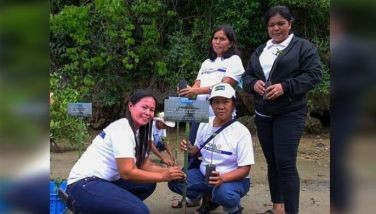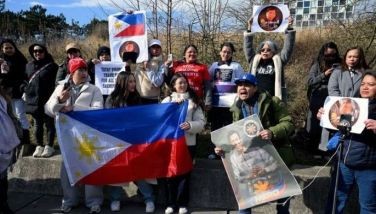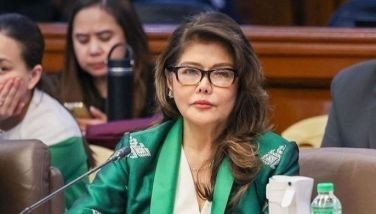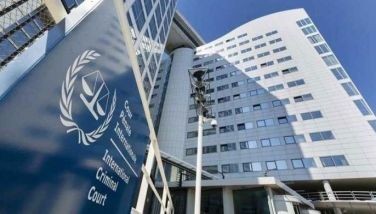Fact check: Secrecy around SALNs not exclusive to Duterte administration
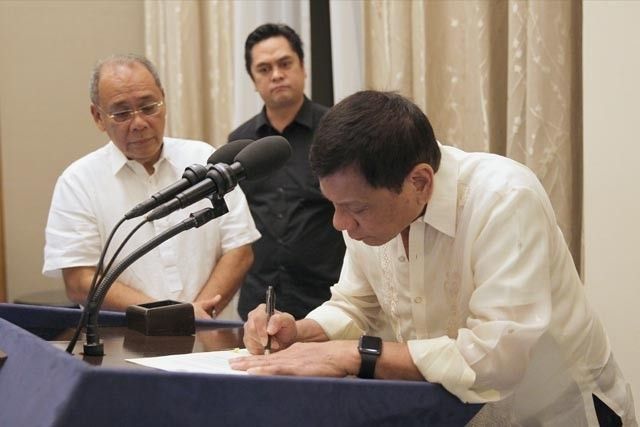
MANILA, Philippines — Malacañang mouthpiece Salvador Panelo in a press briefing on Monday defended not disclosing to the public President Rodrigo Duterte Statement of Assets, Liabilities and Net Worth, which he said has been filed with the Office of the Ombudsman.
This followed a report published by the Philippine Center for Investigative Journalism that pointed out Duterte's SALN for 2018 had yet to be released to the public.
Panelo asserted that although the president’s SALN was not yet available, it was already filed with the Office of the Ombudsman, which, he said, was the extent of Duterte's obligation.
“The law says you file. He has already complied with that,” he asserted. “And it's with the Office of the Ombudsman. That is the repository of the document eh.”
RELATED: Duterte’s secret SALN: The lie of his FOI
But Panelo said that SALN releases during past administrations should not be a precedent for the Duterte administration.
"Maybe that's their style. This president's style is different," he asserted. "[That] doesn't mean he has to follow [past administrations.]"
He said that the president would have no problem if the Office of the Ombudsman were to release the SALN.
"[T]hat is the job of an Ombudsman to release. How can there be any problem [if the Ombudsman releases it?] You are the only ones making an issue of it," he told reporters. "If he is hiding anything, he would not have filed any SALN."
RELATED: New Ombudsman guidelines delay release of Duterte's SALN — PCOO
Constitutional mandate
The Constitution says that public officials must disclose to the public copies of their SALNs. The website of the Office of the Ombudsman itself says that "any interested person" may avail of the SALN request service provided they present a valid ID and a SALN Request Form.
PCIJ said this marks the first time in 30 years that the president of the Philippines has not made public his SALN, which is seen as a safeguard against potential corruption.
According to the Revised Rules on Administrative Cases in the Civil Service, failure to file a SALN can yield a suspension of one to six months after the first offense, while a second offense can hand erring officials termination from their service.
Filing the statements has been required of all government officials in the 1987 Constitution of the Philippines, Article XI Section 17 of which reads:
A public officer or employee shall, upon assumption of office and as often thereafter as may be required by law, submit a declaration under oath of his assets, liabilities, and net worth. In the case of the President, the Vice-President, the Members of the Cabinet, the Congress, the Supreme Court, the Constitutional Commissions and other constitutional offices, and officers of the armed forces with general or flag rank, the declaration shall be disclosed to the public in the manner provided by law.
Transparency, too, is a state policy. In Section 8, Article II, the Charter also reads:
“Subject to reasonable conditions prescribed by law, the State adopts and implements a policy of full public disclosure of all its transactions involving public interest.”
Republic Act 6713, or the Code of Conduct and Ethical Standards for Public Officials and Employees, also requires government officials to submit their SALNs within 30 days of their entering office.
The act explicitly states that “the public has the right to know their assets, liabilities, net worth and financial and business interests.”
‘This President’s style is different’? Not quite
Even with officials who filed their SALNs before the due dates, violations linked to SALN declarations have been historically rampant, experts told The STAR in 2012.
The Department of Finance’s Revenue Integrity Protection Service, their anti-corruption unit, said that common schemes to sidestep the accessibility of SALNs include the non-disclosure of properties, the overstatement of assets and the use of relatives as fronts for properties, among others.
President Aquino linked the additional assets declared on his SALN to the death of his mother, former president Corazon Aquino. He said his increase in wealth came from inheritance.
Former Commission on Elections chair Christian Monsod said in a 2012 interview with ANC that the House of Representatives would release only summaries of SALNs and not the SALNs themselves, calling this tactic “a very creative circumvention of the law.”
Even when no outright restriction was imposed, clear barriers have been erected to deter the public from requesting copies.
In 2009, then-Ombudsman Merceditas Gutierrez issued a memorandum that sought to revisit the guidelines on obtaining copies of SALNs “to protect the integrity of the document.”
As a result, applicants had to swear before a prosecutor of the anti-graft body stating the reasons for the request and that the SALNs would “not be used for harassment.”
This happened just as the PCIJ was conducting research for an investigative piece on then-President Gloria Macapagal-Arroyo’s wealth. The measure held effect following the appointment of then-Ombudsman Conchita Carpio Morales during the Aquino administration.
The same memorandum also outlines grounds for rejecting a request for access to a SALN, which includes: the request is prompted by sheer idle curiosity; the requester has a derogatory record of having misused any information previously furnished; and there are grounds to believe that the request is being made with a plainly discernible improper motive or other analogous circumstances.
PCIJ has been keeping track of president's SALNs even before the Duterte administration.
In 2012, the Palace ruled out online access to Aquino's SALN, and instead pointed requests to the Malacanang Records Office.
Under the same administration, one MRO list sent to reporters contained mere summaries and excluded the SALNs of a number of Cabinet members of the administration, according to a report by Rappler.
In the 17th Congress, then-House Speaker Gloria Macapagal-Arroyo filed a measure that explicitly stated that “the House has the inherent power to regulate access by the public to personal documents, such as the SALNs, in order to avoid damage to or loss of the records.”
VERA Files called this “a step backward for the Duterte administration’s freedom of information initiative.”
Duterte already transparent?
While other presidents did file their SALNs through the Office of the Ombudsman, these were not always made public.
But Panelo insists Duterte had already fulfilled his due transparency by the simple act of filing his SALN with the Ombudsman.
Ombudsman Samuel Martires meanwhile told PCIJ that he was just waiting for the "authority" to release Duterte's SALN.
Yet, the release has been delayed as the guidelines on public access to the document are still pending.
“When you say transparent, you file. The law doesn't require him to produce any copy to anybody who wants it. It is important to file an SALN, that is what the law requires and that is what he complied with,” he insisted.
Former President Aquino, whose net worth rose by more than 300% from 2009 to 2015, was also criticized for not disclosing his wealth to the public.
During a media briefing on May 6, 2012, he was quoted as telling reporters: “Will I disclose it publicly? The minute I submitted it that becomes part of the public record and it’s available.”
He went on to emphasize that the disclosure had a process to follow under the law.
In the wake of media reports on his wealth, Aquino, too, refused to disclose the full details regarding the values of his family’s properties, such as their exact location and size.
Despite his filing a SALN, the supposed transparency of this action still left much to be desired as Aquino declared his assets under the personal and other properties column as “various” expenses, as reported by the PCIJ.
"Instead of taking the lead in pushing for transparency in government, the Office of the President seems to be following the footsteps of other state agencies that would rather keep documents close to their chests," the PCIJ said in 2011.
In dismissing concerns on the chief executive’s wealth, Panelo, too, said, “as far as the president is concerned, there is no issue. If you want a copy of it, you ask the Ombudsman.”
"They should wait for the guidelines," he added. “The repository of those records are with the Ombudsman. Why are you forcing it? Why can't we just wait?"
- Latest
- Trending











